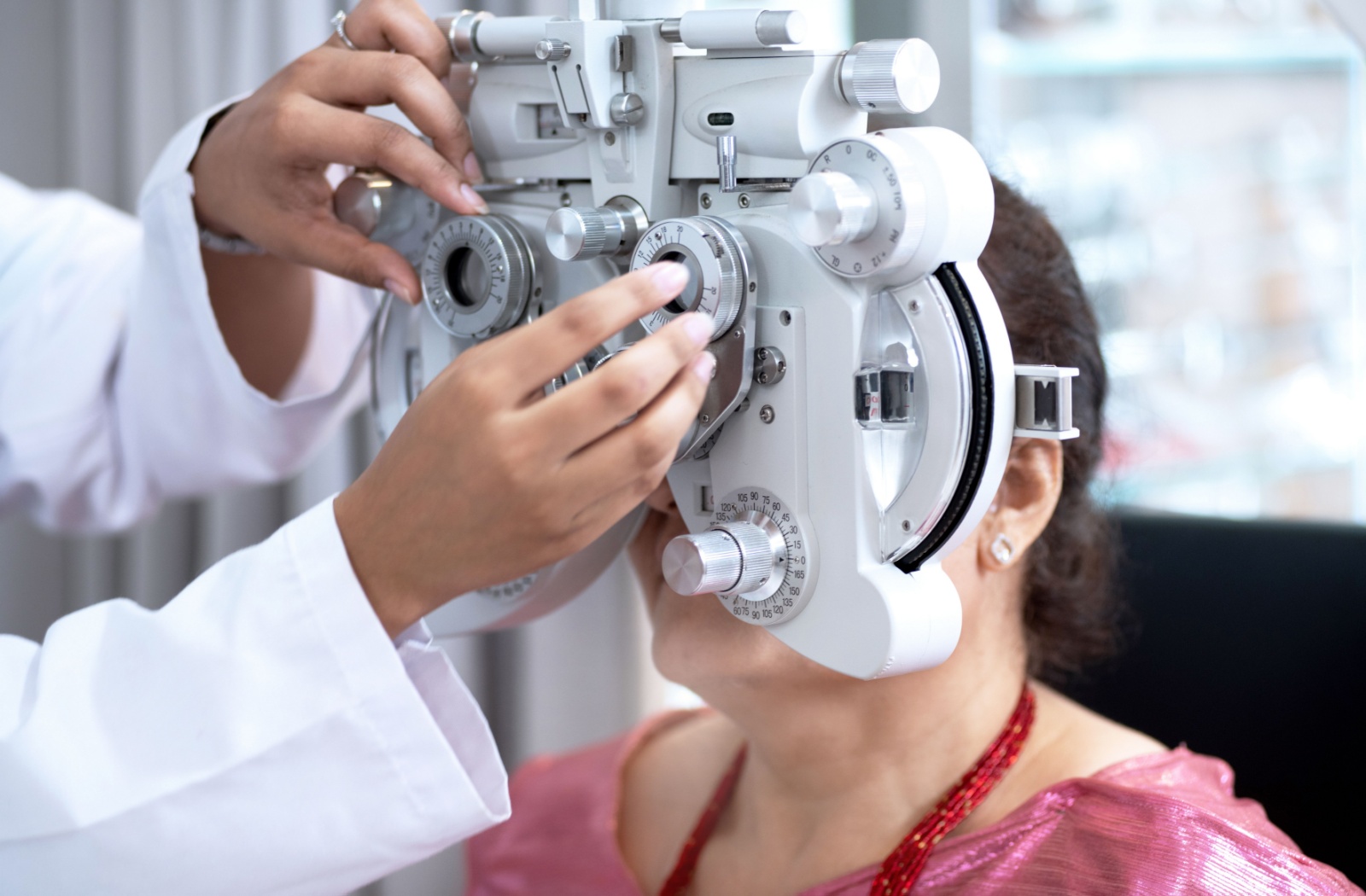Optometric Care Is Part of Diabetes Management
You may not be aware, but diabetes impacts your eyes and vision. People with diabetes should have regular eye exams to mitigate the effects of the condition on your sight–and your overall health.
Diabetes can actually be first detected by an optometrist. Changes in your eyes alert us to the presence of the condition. It is just one more reason why regular eye exams are so vital for your overall health.
If you have diabetes, or if it runs in your family, book an appointment for a diabetic eye exam today. Your health comes first.

How Does Diabetes Impact the Eyes?
Diabetes is a disease that impacts the production of insulin, a hormone produced in the pancreas responsible for regulating your body’s blood sugar levels.
If you have diabetes, your body either does not make insulin or doesn’t use it properly. This means too much sugar stays in the bloodstream.
Fluctuating blood sugar levels for a prolonged period of time can lead to a variety of health issues. Most people are probably aware of the ways in which diabetes impacts your general health, but it is also important to recognize the detrimental effects diabetes can have on your eyes and vision.
Diabetes is a leading cause of new cases of blindness in adults. Comprehensive eye exams are important tools to help protect your vision.
For people with diabetes, we recommend comprehensive eye exams at least annually. After getting to know you and your health, we may suggest a higher frequency dependent upon any eye conditions or vision issues.
Diabetic Eye Conditions
People with diabetes may not notice any changes in their vision, but the disease can impact your eyes in a variety of ways. We employ technology like optomap imaging and fundus photography to view the internal structures of the eye and monitor for any changes occurring as a result of diabetes. Please view our technology page to learn more about these and other tools.
There are several ways in which your eyes and vision can be impacted by diabetes.
Blurry Vision
Several diabetes medications may cause blurry vision as a side effect. If you have recently started or changed medication and your eyes are healthy, your vision may return to normal after your body adjusts to the medication.
Elevated blood sugar can also lead to a buildup of fluid in the eyes. Normally, this is temporary but you should still visit your optometrist to rule out more serious issues.
Diabetic Retinopathy
Diabetic retinopathy often progresses slowly and may not present visible symptoms until irreversible vision loss occurs. Elevated blood sugar levels can cause the tiny, delicate blood vessels which feed your retina to swell.
The blood vessels may eventually break and leak fluid into the eye. In the early stages of diabetic retinopathy, blurry vision is a common symptom.
Some other symptoms of diabetic retinopathy include:
- Loss of central vision
- Flashes of light
- Colour vision deficiency
- Black spots in visual field
As the condition progresses, it gets more serious and may develop into proliferative diabetic retinopathy. If you have the proliferative type of this condition, new, abnormal blood vessels grow to replace the damaged ones. These new blood vessels are prone to leakage, creating scar tissue or leading to retinal detachment.
Diabetic Macular Edema
Diabetic macular edema occurs when the macula swells due to excess fluid from broken blood vessels. The macula is responsible for your central vision so impairment can impact the ability to read, write, drive, and recognize faces. This condition is quite serious and can lead to blindness.
Diabetic Eye Exams Involve Dilation
How is a diabetic eye exam different from a regular eye exam? Your optometrist will perform all of the same tests that normally occur during a comprehensive eye exam, but with a few additional pieces.
It is important that we get a good look at the back of the eye, the portion that includes the retina. The retina is the layer of cells, fed by a network of tiny blood vessels, that sends signals to your brain so that you can see.These blood vessels are so vulnerable to damage when you have diabetes.
For people with diabetes, it is important that they have dilated eye exams. During this type of exam, special drops are placed in your eyes to dilate (widen) your pupils. Larger pupils allow more light in, giving us a better look at the retina and other internal structures of the eyes.
There is no long-term harm from dilating pupils, but you should bring a driver to your exam with you because your vision may remain blurry for a few hours. You should also bring sunglasses to your appointment. Larger pupils make your eyes more sensitive to light.
To learn more about the technology that we use to examine diabetic eyes, please visit our technology page.
Book a Diabetic Eye Exam
If you have diabetes, book your appointment for a diabetic eye exam today. Our in-depth knowledge of diabetic eye disease is just one of the many reasons to choose Advance Eye Care Center.
OUR LOCATION
Visit Advance Eye Care Center in Regina, for all your eye care needs. We offer a number of services, including:
- Adult & Senior Eye Exams
- Children’s Eye Exams
- Diabetic Eye Exams
- Dry Eye Therapy
- Eye Disease Diagnosis & Management
- Trigeminal Dysphoria Treatment
- And more!
Interested in our services? Book an appointment below.
AECC Regina
- 3617B Pasqua Street
- Regina, SK S4S 6W8
Hours of Operation
- Monday: 8:00 AM – 5:00 PM
- Tuesday: 8:00 AM – 5:00 PM
- Wednesday: 8:00 AM – 5:00 PM
- Thursday: 8:00 AM – 8:00 PM
- Friday: 8:00 AM – 5:00 PM
- Saturday: 8:00 AM – 1:00 PM
- Sunday: Closed
*in July and August we are closed on Saturdays and open 8:00 AM – 5:00 PM on Thursdays
Our Brands



See Our Google Reviews
Our Blog
Blepharitis from Eyelash Extensions: Signs It’s Time to See Your Eye Doctor
Eye Care, Eye Conditions & TreatmentsEyelash extensions are a popular beauty trend, offering fuller, longer lashes without daily mascara application. But as stunning as they look, they can sometimes lead to an uncomfortable condition known as blepharitis. If you’ve noticed redness, irritation, or crusting around your eyelash line after getting extensions, despite proper care, it’s time to see your eye […]
Eye Exam Regina: What to Expect
Eye Exams, Eye HealthMaintaining healthy vision is a crucial part of overall well-being. Yet, eye exams are often overlooked until something feels wrong. Regular eye exams help detect early signs of vision issues and identify health conditions such as diabetes, glaucoma, and even hypertension. Some common tests you can expect during an eye exam in Regina include: There […]
Myopia Control Lenses: How They Work & Why They’re Effective for Slowing Nearsightedness
Children’s Eye Care, Contact Lenses, MyopiaMyopia, commonly known as nearsightedness, is one of the most widespread vision concerns among school-aged children. While glasses or contact lenses can provide clear vision, they don’t prevent the condition from worsening over time. That’s where myopia control lenses come in. Myopia control lenses work by correcting blurred vision while gently defocusing peripheral vision, which […]
Blepharitis from Eyelash Extensions: Signs It’s Time to See Your Eye Doctor

Eyelash extensions are a popular beauty trend, offering fuller, longer lashes without daily mascara application. But as stunning as they look, they can sometimes lead to an uncomfortable condition known as blepharitis. If you’ve noticed redness, irritation, or crusting around your eyelash line after getting extensions, despite proper care, it’s time to see your eye […]
Eye Exam Regina: What to Expect

Maintaining healthy vision is a crucial part of overall well-being. Yet, eye exams are often overlooked until something feels wrong. Regular eye exams help detect early signs of vision issues and identify health conditions such as diabetes, glaucoma, and even hypertension. Some common tests you can expect during an eye exam in Regina include: There […]
Myopia Control Lenses: How They Work & Why They’re Effective for Slowing Nearsightedness

Myopia, commonly known as nearsightedness, is one of the most widespread vision concerns among school-aged children. While glasses or contact lenses can provide clear vision, they don’t prevent the condition from worsening over time. That’s where myopia control lenses come in. Myopia control lenses work by correcting blurred vision while gently defocusing peripheral vision, which […]


